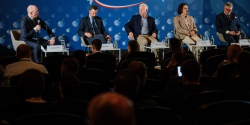Published: 10.09.2024

· The XXXIIIth Economic Forum took place last week in Karpacz. It is often dubbed the Davos of Central Europe.
· One of the discussion panels was organized by the Ordo Iuris Institute.
· The debate was entitled “Empire of Europe or Europe of Nations: What Direction Should the Reform of the EU Treaties Take?”
· The event was attended by experts, including politicians, from Poland, Hungary, Belgium, and Spain.
The discussion focused on the ongoing process of reforming the European Union’s treaties. The model for changing the EU’s system was voted on by the European Parliament in November 2023. It assumes the transfer, in whole or in part, of ten areas of sovereignty that currently belong to the nation-states: climate policy, defense, the protection of the Union’s external borders, education, health, family law, and the regulation of cross-border infrastructure and industry. Additionally, there would be no requirement for subsequent reforms to be ratified by all the member states, and the interpretation of EU law by the EU Court of Justice would be made supreme even over the constitutions of the individual member states. What this means is that even the extremely radical changes to the treaties advocated by the European Parliament would only be the beginning of the process of creating a European superstate. An entire report by the Ordo Iuris Institute was devoted to this problem.
The panel discussion held at the Karpacz Forum was led by Jerzy Kwaśniewski, the President of the Ordo Iuris Institute for Legal Culture. He pointed out that there is currently scant interest in treaty reform in the EU countries. As he emphasized:
“We are undergoing the deepest reform of our constitutional system in the European Union […] Just imagine that the Congress and Senate of the United States had already accepted 267 amendments to the US Constitution. Nobody cares. Nobody speaks about it. And it is not a hot topic in the sphere of public opinion. That’s how we feel in Europe. The fact that 267 amendments to the European treaties have been accepted by the European Parliament according to the provisions of the Lisbon Treaty for the first time, and were already accepted last year by the Council, is not a matter of importance for most of European citizens.”
For his part, former Speaker of the Sejm and former MEP Marek Jurek stressed that plans to centralize Europe go back a long way. He noted:
“There is a common view that European integration was a very good, modest, purely economic project which later developed a very bad side. In fact, however, if we look back at history – not to the Treaty of Rome, but two years earlier, to the projects of the European Political Community and the European Defense Community – they more or less went to the point where we are at today. That is, to transcend, to dominate, and to create institutions that will hold supremacy over the national states.”
He also mentioned a certain naiveté that prevailed among Poles when Poland joined the European Union in 2004. On the other hand, he also pointed out that the subsequent crises which were triggered or aggravated by the actions of either the Union or its strongest members, such as those concerning illegal immigration, might have eroded this initial enthusiasm.
In turn, Prof. David Engels, a Belgian historian, pointed out the European Union’s weakness in the face of external threats, while at the same time limiting the sovereignty of its member countries. As he noted:
“The European Union […] is becoming more and more oppressive toward the nation-states and toward every single issue. When it comes to the outside world, when it comes to defending European interests against Russia, against China, against Muslim mass migration, against all that, the European Union is non-existent. […] It is important to work together, but not on oppressing a single nation-state, its family politics, its identity politics, or what teach at school - that kind of thing.”
He added that “the main problem with today’s European movement is not even the institutions as they are, but it is rather the ideology that leads them. It’s an ideology that is not a patriotic European one, but one which is a universalist, hedonistic, materialistic, absolutely atheistic ideology that exploits these institutions.”
Meanwhile, Polish MP Przemyslaw Wipler spoke about the problem of immigration. In his opinion, this issue may be of great importance when it comes to shaping the political scene in Poland. He stressed:
“The fact that the Migration Pact will be implemented in 2026 will be a huge shock for the people who currently rule Poland. If it was to be implemented next year, I think Donald Tusk would do everything to veto it, especially if it were to be adopted by the EU before the presidential elections. […] If the migration package is implemented in 2026, if it really starts, in my view it will have a very significant impact on the election results in the 2027 parliamentary elections…”
Also participating in the debate was Professor Ricardo Ruiz de la Serna, an attorney and the head of research and training at the Disenso think tank in Spain. He pointed out the importance of the EU’s environmental policy and how it affects social processes:
“The most violent [topic in the public debate] has to do with the green transition, or the green thing, let’s say, because it’s not just a transition. There is a whole set of values behind it concerning the role of human beings, the relationship between human beings and nature, and the relationship between economic development and nature. I mean, it’s more complicated than just technology and economics. There is a model for society behind it...”
Peter Törcsi, a lawyer and writer from Hungary who is also the Chief Operations Officer of the Center for Fundamental Rights, pointed out the need to return to Europe’s Christian heritage:
“I think what we should build upon to create Europe’s future is cultural Christianity, because it is accepted even by those who claim to be atheists. Their moral obligation to refrain from doing certain things is rooted in Christianity, not in their penal codes and legal system.”
Ricardo Ruiz de la Serna in turn pointed out at the end that "behind this proposal for reforms, there is a model of a society that opposes the fundamentals, the very basics of our civilization. It is a 25-century-old civilization whose roots are in Greece, Rome, and Jerusalem – the Bible. A civilization that is the heir of Rome, of Greece, of Christianity, and in the Spanish and Polish cases, the Catholic Church. And there is a historical process. The question is: is there anything in that process that is worth preserving? Is there something in that historical process that we value, that we hold dear, that we love? And against all the projects of the elites, when it comes to popular culture, when it comes to daily life, when it comes to heroes, when it comes to sport teams, when it comes to everything that we’ve identified with – all of that is national. It’s Polish, it’s Spanish, it’s French, it’s Italian, it’s Greek, and at the same time it is European. That’s the core of the issue. There is not a contradiction between national identities and the European identity. There will not be a European identity without European nations.”
MP Przemyslaw Wipler stated that he does not believe that it is through the European Parliament that the Union can be put on the right track, however:
“I think that the key role here will be played in particular by the member states and by using their right of veto in a brave way, whenever it is necessary.”
This is because in order for the new treaties to be adopted, they will need to be ratified by each member state. In the opinion of the participants in this debate that was organized by the Ordo Iuris Institute in Karpacz, the treaties are indeed worth amending, since one of the biggest problems in the European Union today is that there is no effective mechanism in place to verify compliance with those laws which are enacted by EU institutions with the treaties, and they frequently go beyond what the EU is mandated to do. It is therefore certainly necessary to restore and strengthen the principle of subsidiarity.
Pictures by courtesy of Hungary's Center for Fundamental Rights.

31.01.2025
• The European Commission has announced the inclusion of a revised Code of Conduct on Countering Illegal Hate Speech Online in the Digital Services Act.

02.01.2025
• The results of the latest report, EU Gender-based Violence Survey – Key Results, on the topic of violence against women, which includes data from 27 member states, show that Scandinavian countries such as Denmark, Finland, and Sweden have some of the highest rates of violence against women (52%, 47%, and 46%, respectively).

• The European Parliament will debate the draft recommendations of the EU Committee on Women’s Rights and Gender Equality (FEMM).

• On December 1-3, in the plenary hall of the Spanish Senate, members of the Political Network for Values from 45 countries, from the four continents bordering the Atlantic, met at the “VI Transatlantic Summit.” Among them were representatives of the Ordo Iuris Institute, which co-organized thi